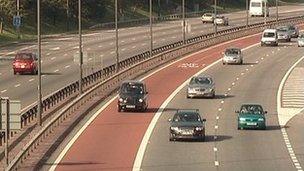Drivers 'save 60 seconds' on M4 after bus lane scrapped
- Published

Many complained the bus lane was rarely used
Motorists heading into London on the M4 have had 60 seconds shaved off their journey times after a controversial bus lane was scrapped, figures suggest.
The motorway's third lane was reopened to all traffic a year ago, ending what the then Transport Secretary Philip Hammond called "a piece of folly".
The Highways Agency is reviewing the impact of the bus lane's closure and will publish its findings next year.
The interim figures were in a response to a written parliamentary question.
Only buses, licensed black taxis and motorcycles were allowed to use the 3.5-mile bus lane between Heathrow Airport and central London, introduced in 1999 by John Prescott.
During its 11 years, the bus lane was criticised for being rarely used and earned the nickname the "Blair lane" after the former prime minister used it to avoid heavy traffic.
Speaking last year, Mr Hammond called it symbolic of Labour's ''war on the motorist'' while Top Gear presenter Jeremy Clarkson dismissed it as "idiotic"
But Mr Prescott argued studies had proved the bus lane reduced traffic jams.
Since its closure at an estimated cost of £400,000, journey time savings for cars were "in the order of 60 seconds", Transport Minister Mike Penning said.
This was calculated by the Highways Agency, comparing journeys captured on camera between January and June this year and those in the same period in 2010.
It also found that on average, 15,500 vehicles used that eastbound stretch of the M4 between 0700 and 2000 every day for the first six months of the year.
Next year, the bus lane is to be temporarily restored for the London Olympics, after which it is likely to be scrapped altogether.
Paul Watters, head of road policy for the AA, said: "The bus lane was a symbol of an era that was trying to make motorists out to be an unnecessary evil on the road."
He said it had merely relocated a queue, and had failed to encourage new bus services to open up.
"We were happy to see it go," he said, although he added that the 60-second saving for drivers was "marginal".
"It's more of a psychological benefit - they feel better not seeing some traffic sailing past them or an empty lane."
However, morning rush hour journeys into London remained a lottery that only a major programme to increase road capacity could solve, he said.
"It would probably be worth doing in economic terms, but politically it would be considered a construction scheme too far."
'M4 myth'
The Confederation of Public Transport UK (CPT), the industry group representing bus and coach companies, said it had no figures on the impact on bus services, but believed giving buses priority would make public transport more attractive to travellers.
At the time of its closure, the Licensed Taxi Drivers Association said it was a myth that the bus lane was hardly used, adding that most of the 4,000 daily cab journeys from Heathrow used the M4 bus lane.
But for one of its competitors, the minicab firm Addison Lee, the bus lane's closure was a welcome relief.
It had faced hundreds of penalty notice fares and 130 court summonses after its chairman ordered drivers to use the bus lane, citing competition laws and the 25 minutes saved by using the bus lane.
When the government said it would scrap the lane, the Crown Prosecution Service dropped the cases.
Addison Lee chairman John Griffin said his firm had found that by opening up the bus lane, all traffic had speeded up.
The decision to restore the lane for the Games is to honour an agreement made regarding the Olympic Route Network.
Roads on the Olympic Route Network can only be used by athletes, Olympic officials and journalists, and the system is designed to ensure speedy journeys between venues.
In September, the Commons transport committee called on the government to publish an assessment of traffic flow on the M4 in London since the bus lane was scrapped.
The committee said the bus lane should be reinstated if evidence showed that, taking into account all travellers, it contributed to faster traffic movement.
The Highways Agency said it did not have figures to show the impact of the bus lane closure on bus travel times.
It added that its review, to be published in the spring, would help inform a final decision on the bus lane's permanent removal.
- Published1 October 2010
- Published1 October 2010